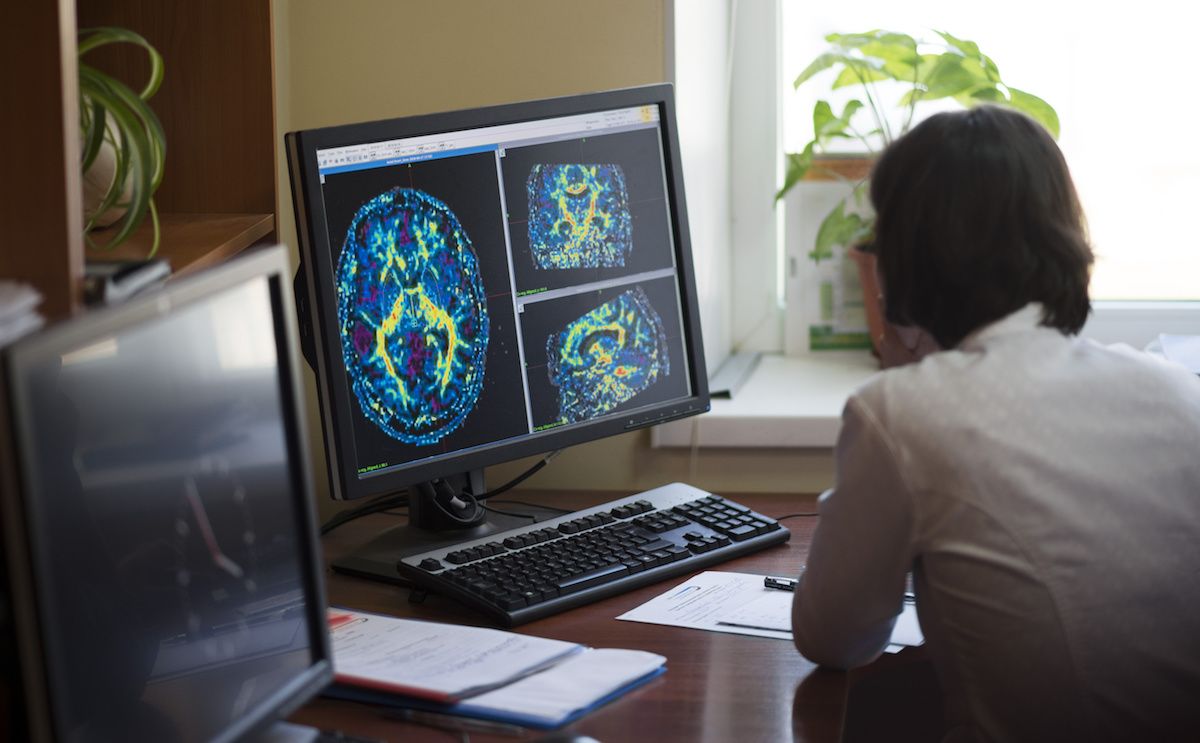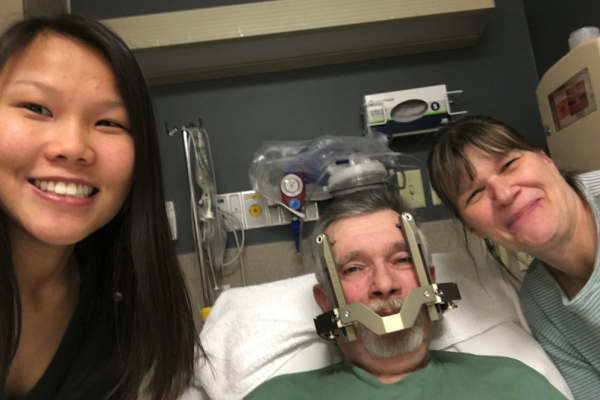Usually it's not, but this type of brain tumor needs expert care
Keith Cordaro, 69, remembers exactly when he got “the headache” four years ago. “My daughter and I were on a train going to New York City, and all of a sudden I thought the top of my head was going to explode.” The headache went away after a while, but a few days later, it came back again with the same intensity.
So Keith did exactly what neurosurgeons at Roswell Park Comprehensive Cancer Center recommend in the case of severe and persistent headaches that are different from your normal pattern of headaches: “I called my doctor as soon as I got home and was quickly evaluated.”
An MRI showed that Keith had a benign (noncancerous) meningioma — the most common kind of brain tumor in adults. “My neurologist told me we could just keep an eye on my tumor to see if it would grow, or he could refer me for Gamma Knife radiosurgery," a state-of-the-art focused radiation treatment available regionally only at Roswell Park. "I didn't want to risk having the tumor grow, so I chose to be treated at Roswell Park,” adds Keith. Four years later, his tumor remains small and is causing no adverse effects.
What are meningiomas?
A meningioma is just one of the more than 120 types of tumors that can occur in the brain. Meningiomas occur when cells from the membrane covering the brain and spinal cord (called the meninges) grow and multiply out of control. These primary tumors are different from metastatic brain tumors, in which cancerous cells travel from other sites, such as the breast or lung, to the brain.
Meningiomas usually occur in people aged 40 to 70 and are more common in women than men. About 3% of people over age 60 develop meningioma.
Menigiomas fall into three general types: benign, atypical and malignant. About 85-90% of meningiomas are truly benign, although they may grow inside the head and cause problems by pressing on the brain. Atypical meningiomas are more difficult to eliminate by surgery alone and may recur locally after treatment. Malignant meningiomas, while uncommon, behave like a cancer and can spread directly into the brain, causing serious neurologic symptoms.
Why treat a benign tumor?
Some benign meningiomas grow very slowly — or seemingly not at all — and can be followed closely without treatment. However, “even a benign tumor that’s growing inside the head is potentially very dangerous," says Robert Fenstermaker, MD, Chair of the Department of Neurosurgery at Roswell Park.
"There’s only so much room inside the skull, and the brain occupies most of it. When a tumor begins growing in that space, whether it’s benign or malignant, it may start to press on the brain and cause serious neurologic symptoms — seizures, paralysis, speech problems or blindness — so it has to be treated quickly and effectively.”
Dr. Fenstermaker also stresses the importance of receiving treatment at a National Cancer Institute-designated comprehensive cancer center like Roswell Park. “Most neurosurgeons are trained to treat people with trauma to the brain and spine, aneurysms, blocked arteries, chronic low-back pain, birth defects and peripheral nerve issues.
"However, not all neurosurgeons concentrate their practice on treating brain tumors,” he says. “At a comprehensive cancer center like Roswell Park, we have a whole neuro-oncology team, including neurosurgeons, medical neuro-oncologists and radiation oncologists who research and treat all tumor types found in the central nervous system.”
In addition, at Roswell Park, patients like Keith benefit from advanced, minimally invasive treatment techniques such as Gamma Knife radiosurgery. At facilities without Gamma Knife capability, patients with brain tumors and metastases would likely undergo invasive surgery or less-sophisticated forms of radiation therapy that expose more brain tissue to the effects of radiation. With Gamma Knife radiosurgery, much less brain tissue is irradiated, preserving brain function and improving both medical outcomes and quality of life for patients.
At Roswell Park, Keith’s Gamma Knife procedure was performed by Dheerendra Prasad, MD M-CH, Professor of Neurosurgery and Radiation Oncology and Director of Roswell Park’s Gamma Knife Center. “As soon as I met Dr. Prasad, I knew I was in the right hands,” says Keith. Indeed, Dr. Prasad has treated more than 9,000 patients with Gamma Knife and is an onsite advisor to institutions around the world that are training to use the technology.
What are the symptoms of meningiomas?
Because meningiomas are usually slow-growing tumors, they often do not cause noticeable symptoms until they are quite large. Some people with meningiomas may never experience any symptoms, and the tumor can go undetected until the patient has a brain scan for unrelated symptoms.
In other patients, serious neurologic symptoms may develop, leading to suspicion of a brain tumor diagnosis. These symptoms can include:
- Muscle jerking or twitching (possibly signifying seizures or convulsions)
- Headaches, especially severe or new-onset headaches that are frequent and different from a person’s usual headache pattern
- Changes in speech, vision or hearing
- Problems balancing or walking normally
- Changes in mood, personality, ability to concentrate or loss of interest in activities (apathy)
- Problems with memory
- Numbness or weakness of the arms, legs or face
- Loss of sense of smell
Why Roswell Park for Brain Tumors?
Find out what makes Roswell Park unique for treating brain tumors.
Learn MoreHow are meningiomas diagnosed?
There is no way to tell from symptoms alone if a tumor is benign or malignant. In addition to neurologic exams and blood tests, most patients will undergo an MRI or CT scan. Sometimes these scans can reveal the tumor type, but in many cases, a biopsy is also required.
At Roswell Park, neuroradiologists Ronald Alberico, MD, Director of Neuroradiology/Head & Neck, and Ahmed Belal, MD, are specially trained to create and interpret images of the brain, spine, head and neck, and to help surgeons precisely guide medical instruments to the tumor to obtain biopsies and assist with diagnosis by imaging specific features of a tumor.
If it is necessary to obtain a biopsy, it will be examined by a pathologist. Because brain tumors account for fewer than 5% of all cancers, many pathologists will see very few of them over the course of their careers. At Roswell Park, however, Jingxin Qiu, MD, PhD, head of Roswell Park’s Neuropathology Service, is an expert in interpreting brain biopsy results. As a fellowship-trained, board-certified neuropathologist, Dr. Qiu examines and interprets many different types of brain tumor biopsies every single day.
How are meningiomas treated?
“Depending on the patient's age and gender and the size, location and symptoms caused by a benign meningioma, we may just recommend regular exams and scans,” says Dr. Fenstermaker. “However, if we determine that the tumor needs to be reduced in size or removed, we will usually recommend surgery, Gamma Knife or a combination of the two."
Very often, meningiomas are best treated using a combination of invasive neurosurgery followed by minimally invasive Gamma Knife treatment. This combination treatment is especially useful for larger meningiomas that are causing neurologic symptoms in patients for whom total removal would be too difficult or dangerous. In these situations, the neuro-oncology team of specialists works together in a multidisciplinary fashion for the greatest benefit of the meningioma patient. For this reason, it’s important to seek care from a multidisciplinary team with specialists skilled in each of the different treatment approaches, but who work closely together every day of the week.
Is meningioma deadly?
Left untreated and unmonitored, meningioma has the potential to be deadly. However, most patients with benign meningioma can be cured if they receive the correct care. The overall 10-year survival rate for benign meningioma is 84%. Malignant meningiomas are more difficult to treat. They grow rapidly and are invasive. The overall 10-year survival rate for malignant meningioma is 62%.
If you have a suspicion or diagnosis of a brain tumor, you need a second opinion. Our experts can review your scans and/or pathology report and arrange for a consultation with a member of our neuro-oncology team.




